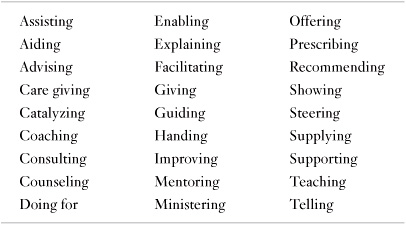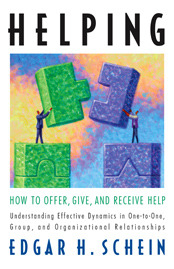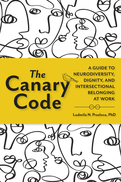Helping
1
What Is Help?
Helpful and Unhelpful Help
Helping is a complex phenomenon. There’s helpful help and unhelpful help. This book is written to shed light on the difference between the two. In my career as a professor and sometimes consultant I often reflect on what is helpful and what is not, why some classes go well and others do not, why coaching and experiential learning are often more successful than formal lectures. When I am with organizational clients, why does it work better to focus on process rather than content, or how things are done rather than what is done? My goal in this book is to provide the reader with enough insight to be able to actually help when help is asked for or needed, and to be able to receive help when help is needed and offered. Neither is as easy as we often wish.
The other day, for example, a friend asked me for some advice on how to deal with a problem he was having with his wife. I offered a suggestion to which he replied huffily that not only had he already tried that and it didn’t work, but he also implied that I was insensitive to have even made that suggestion. It reminded me of many other situations I have witnessed where help was asked for or offered but the result felt unsuccessful and uncomfortable.
Then I was reminded of a case of helpful help. Outside my house a woman in her car drove up and asked me, “How do I get to Massachusetts Ave.?” I asked her where she was headed and learned that she wanted to go to downtown Boston. I then pointed out that the road she was on led directly to downtown and she did not need Mass. Ave. She thanked me profusely for not sending her to the street she had asked for.
The most common version of unhelpful help that I have experienced as both helper and client concerns the computer. When I call the help line I often don’t even understand the diagnostic questions that the helper asks me in order to determine what help I need. When my computer coach tells me the several steps I need to take to solve the problem, I don’t know how to interrupt to say, “Wait, I don’t understand the first step.” On the other hand, another computer coach I hired asked me what my personal goals were in learning to use the computer, elicited my desire to use it primarily for writing, and then showed me all the programs and tools that would make writing easier. That felt great. Yet when my wife asks me for help with the computer, I routinely fall into the same trap of telling her what I would do, which turns out to be more than she can handle, and we both end up frustrated.
Friends, editors, consultants, teachers, and coaches have often made suggestions and proposals that were quite irrelevant to my problem at the time. Even when I ignored them as gently as I could, my sometimes self-appointed helpers reminded me in an irritated tone that they were only trying to be helpful, implying that I was wrong in some way not to have been able to accept the help.
I remember one of my children asking me for help with her math homework. I interrupted my work, did the problem for her, only to find her sulking off without a thank you. What had I done wrong? On another occasion a child asked for homework help and I said, “Let’s talk. . . .” I discovered that she wanted to talk about some serious social problems at school that had nothing to do with homework. We had a good talk and both felt better.
Doctors, therapists, social workers, and coaches of all sorts have had the experience of the best-intended help going wrong somehow. As a consultant and career coach to managers in various kinds of organizations, I have often figured out solutions to problems that they posed, and only later discovered that either my advice did not work or the client could not or would not implement what I had suggested. I also remember in my own consulting how often it happened that when I intervened to point out some dysfunctional behavior in a group meeting, I was thanked for being very helpful, only to find that the behavior did not change one iota.
Help is, of course, not limited to the one-on-one situation. Group effort and teamwork often hinge on the degree to which members perform their roles properly in accomplishing the group’s task. We do not typically think of an effective team as being a group of people who really know how to help each other in the performance of a task, yet that is precisely what good teamwork is—successful reciprocal help. It is interesting to note, however, that the word “help” is only used in relation to teamwork when it does not occur, as when one group member says to another, “What you did was not helpful” or “Why didn’t you help more?”
Helping in a team context is most obvious in team sports, where the ability of one player to score is entirely dependent on the skill of others to pass or block. There are many football stories of successful runners taking their linemen out to dinner after a successful game in acknowledgment of their support. Failure to help in this regard becomes obvious when the quarterback is sacked or the runner is tackled behind the line.
Clearly, there is more to helping or being helped than meets the eye. This seemingly common and very necessary human process is, in fact, fraught with difficulty and often does not succeed. This book starts with the premise that help is an important but complicated human process. I examine what it really means to help or be helped; what psychological, social, and cultural traps are inherent in this process; and how one can avoid them. As the examples above show, help refers to many things other than the professional help we expect from doctors, lawyers, ministers and social workers. So what is it all about and how do we ensure that it works?
The Multiple Meanings of Help
Helping is a very broad concept ranging all the way from the knight in shining armor rescuing the maiden before she is eaten by the dragon to the consultant working with an organization to change its culture to meet new strategic objectives or to improve its performance. From a client perspective, help includes not only what we ask for, but also the spontaneous and generous behavior of others who recognize when we need help even if we have not asked for it.
Consider the many life situations in which helping of some sort is involved (see Table 1.1). It occurs all the time in both formal and informal situations, and many of the roles described in Table 1.1 are ones we are called on to play ourselves at various times in our lives. To go one step further, helping is intrinsic to all forms of organization and work, because, by definition, we organize because we cannot do the whole job ourselves. Hired help truly refers not only to servants and caretakers, but applies equally to all organizational employees hired to do a specific job that we cannot do ourselves. Fulfilling one’s duties in a job is, therefore, also a routine way in which we help. Consider the tensions that arise between supervisors and subordinates when either the subordinate did not put forth the effort to complete the task or the boss did not provide the time or other resources to get the job done. Workers and their bosses have a sort of psychological contract based on what kind of help they can expect from each other.
TABLE 1.1 The Many Forms of Help
The stranger giving the tourist directions
The parent doing the child’s homework
The spouse advising on what to wear for the party
The nurse assisting a patient with the bedpan
The friend supplying a word that is on the tip of your tongue
The guest offering to clear and do the dishes
The teacher explaining a concept to a student
The computer expert walking you through steps to fix a computer problem
The 911-hotline operator or suicide hotline operator advising someone in distress
The child showing a friend or parent how to use a new phone or video game
The coach showing the client how to improve some skill
The operating-room nurse handing the surgeon the right instrument just in time
The blocker creating a hole for the runner to run through
The executive coach advising a manager on how to handle subordinates
The improvisation team member setting up his/her partner to deliver the punch line and get the laugh
The counselor assisting a laid-off worker to find a new job/career
The boss advising subordinates how to do their job better
The assembly line worker putting his or her part in on time so that the line can move on
The caregiver ministering to a sick person
The lawyer advising and instructing the client on how to manage a divorce
The social worker suggesting how a family can cope with an economic crisis
The psychotherapist working with the client to cope with behavior problems or emotional difficulties
The minister showing a parishioner how to cope with guilt, grief or anxiety
The doctor diagnosing a patient and providing a prescription
The funeral director helping the grieving family cope with death
The consultant trying to improve the functioning of an organization
To illustrate further the extensive nature of this concept, note how many different words we use that mean to help in some way (see Table 1.2). Is there anything that all of these helping processes have in common? Is there an underlying cultural meaning that both helpers and clients need to understand better to improve the quality of help offered, given, asked for, and received? With the various kinds of help that exist—physical help, emotional support, information, diagnostic insight, advice and recommendations—do they need to be distinguished? How are they similar or different?
TABLE 1.2 The Many Words for Helping

Formal and Informal Help
In the routine of daily life, help is the action of one person that enables another person to solve a problem, to accomplish something, or to make something easier. The person being helped might or might not have been able to do it alone, but helping implies that the task was made easier somehow, or, in the extreme, that it was accomplished at all (as when we save a drowning person). Help is thus the process that underlies cooperation, collaboration, and many forms of altruistic behavior. I will call this category “informal” help. In all cultures, this form of help is institutionalized and taken for granted as a basis for civilized society. It probably has some biological genetic basis since we know that non-human species engage in this behavior as well. Helping is part of what we think of as manners, rules of civilized behavior, and ethical and moral behavior. Such helping occurs all the time in a routine fashion. Note also that a request or offer of help cannot be ignored—it has to be dealt with in some fashion or the social fabric is torn a little and the actors are embarrassed.
The next level of help can be thought of as “semi-formal,” where we go to technicians of various sorts to get help with our houses, cars, computers, and audio-visual equipment. Here we require help in making something work, are less involved personally, and pay for the service or information. Many of our most frustrating experiences both as clients and helpers occur in this domain because of our expectation that things should be easy to use and our unwillingness to adapt to new languages and routines such as those required by computers.
“Formal” help is needed when we are in some kind of personal, health, or emotional difficulty and need medical, legal, or spiritual assistance from someone licensed to provide such assistance. We go to doctors, lawyers, priests, counselors, social workers, psychologists, and psychiatrists for individual attention. When in our managerial and organizational roles we have problems of governance and organizational performance, we go to consultants of various sorts. In these cases the help comes from professionals and is a more formal process that implies contracts, timetables, and the exchange of money or other valuables for services. Most analyses of help deal with this formal level, yet informal and semi-formal help are far more common and often have greater consequences if not given or received effectively.
We will consider whether the help that occurs in more formal situations is different from the day-to-day informal and semi-formal help. What do effective trained and licensed helpers do that makes them more or less successful, and what can we learn from them to enhance our skills in less formal settings? Equally relevant is to ask what the trained helper can learn from a closer examination of the dynamics of informal and semi-formal help.
Helping Is a Social Process
Helping involves more than one person, so I will concentrate on how to think about and define the helping relationship. That focus will, in turn, lead us to a discussion of what is involved in any relationship and what it means to have a good relationship, one in which we can trust each other and can communicate openly.
All relationships are governed by cultural rules that tell us how to behave in relation to each other so that social intercourse is safe and productive. We call this good manners, tact, or etiquette. Underneath this surface level of overt behavior lie powerful rules that must be followed for society to work at all. Some of these rules vary according to the situation, but in any given culture there will be a set of universal rules that, if violated, cause the person to be ostracized or isolated. When they are violated in an ongoing interaction we become offended, embarrassed, or suspicious that the relationship is not good. This may result in a lack of trust or hurt feelings if the client felt that no help was provided, or the helper felt refused or ignored.
Though helping is a relationship, the process of offering, giving, or receiving semi-formal or formal help usually starts with individual initiative. What we must understand, then, is how the initial contact between the potential helper and potential client evolves into a relationship that produces help. Someone decides to give or offer help, and that action may lead to a helping relationship; or someone may ask for help, which could also result in a helping relationship. A team leader brings together a bunch of people and creates a relationship-building process that leads to mutual helping among team members. A consultant helps a manager organize different units so that they can help each other in achieving organizational tasks. Sometimes a group or community recognizes that it collectively needs help, but someone must articulate the need and bring it to public consciousness. A relational helping process can then be created.
The first thing to focus on, therefore, is how personal initiative leads to a relationship. If we understand the dynamics of building any relationship, we can build a more effective helping relationship.
In the next chapters I will examine what some of the ultimate rules are that govern relationships and how they apply to helping relationships. We will examine the inequities and role ambiguities of helping relationships, the different roles that helpers can take once the relationship is balanced and comfortable, how to build such a relationship, and how to intervene as the client/helper relationship evolves.










